By: Imaam Yakhsyallah Mansur
بِسْمِ اللَّهِ الرَّحْمَنِ الرَّحِيم
First Sermon:
إنَّ الـحَمْدَ لِلّٰهِ نَـحْمَدُهُ وَنَسْتَعِيْنُهُ وَنَسْتَغْفِرُهُ، وَنَعُوذُ بِاللّٰهِ مِنْ شُرُورِ أَنْفُسِنَا وَمِنْ سَيِّئَاتِ أَعْمَالِنَا مَنْ يَهْدِهِ اللَّهُ فَلَا مُضِلَّ لَهُ وَمَنْ يُضْلِلْ فَلَا هَادِيَ لَهُ، أَشْهَدُ أَنْ لاَّ إِلَهَ إِلاَّ الله وَحْدَهُ لَا شَرِيْكَ لَهُ، وَأَشْهَدُ أَنَّ مُـحَمَّداً عَبْدُهُ وَرَسُولُه، اللّٰهُمَّ صَلِّ و سَلِّمْ وَبارِكْ عَلَى سَيِّدِنا مُحَمّدٍ وَعَلَى اٰلِه وَأصْحابِهِ وَالتَّابِعينَ بِإحْسانِ إلَى يَوْمِ الدِّين، أَمَّا بَعْدُ: فَيَا أيُّهَا الإِخْوَة أوْصُيْكُمْ وَنَفْسِيْ بِتَقْوَى اللهِ وَطَاعَتِهِ لَعَلَّكُمْ تُفْلِحُوْنْ، قَالَ اللهُ تَعَالىَ فِي اْلقُرْانِ اْلكَرِيمْ: يَا أَيُّهَا الَّذِينَ آمَنُوا اتَّقُوا اللَّهَ حَقَّ تُقَاتِهِ وَلَا تَمُوتُنَّ إِلَّا وَأَنْتُمْ مُسْلِمُونَ، وَقَالَ الَنَّبِيُ صَلَّى اللّٰهُ عَلَيْهِ وَسَلَّمَ .فَإِنَّ خَيْرَ الْحَدِيثِ كِتَابُ اللَّهِ، وَخَيْرَ الْهَدْيِ هَدْيُ مُحَمَّدٍ، وَشَرَّ الأُمُورِ مُحْدَثَاتُهَا، وَكُلَّ مُحْدَثَةٍ بِدْعَةٌ، وَكُلَّ بِدْعَةٍ ضَلاَلَةٌ، وَكُلَّ ضَلاَلَةٍ فِي النَّارِ.
Also Read: Imaam Yakhsyallah Mansur: Surah At-Tin Indicates the Command to Liberate Al-Aqsa
On the occasion of this Friday sermon, the preacher invites himself, his family and all audience, let us always strengthen faith and piety to Allah Subhanahu wa Ta’ala by always being grateful for all the blessings and gifts bestowed upon us.
A servant who always strengthens his faith and strengthens his piety, he will get happiness, success, and victory in the life of this world and the hereafter.
Someone who is firm and steady in his faith and piety, then he will get help and solutions in every problem he faces, and become lovers of Allah Subhanahu wa Ta’ala, both in this life and in the hereafter.
Maasyiral Muslimin, hafidzakumullah Ta’ala
Also Read: Imaam Yakhsyallah: Nurture Love for the Prophet, One Will Be with Whom One Loves
On the occasion of this Friday sermon, let us meditate on the words of Allah Subhanahu wa Ta’ala contained in surah Yunus [10] verses 62-63, which reads:
أَلَآ إِنَّ أَوْلِيَآءَ ٱللّٰهِ لَا خَوْفٌ عَلَيْهِمْ وَلَا هُمْ يَحْزَنُونَ (٦٢) ٱلَّذِينَ ءَامَنُوا۟ وَكَانُوا۟ يَتَّقُونَ (٦٣) (يونس [١٠]: ٦٢ـــ٦٣)
“Remember, verily the friends of Allah, there is no concern for them and they are not (also) sad. (That is) those who believe and they are always pious.”
Shaykh Al-Hafidz Abul Fida’ Ismail Ibnu Katsir, in his commentary explaining the verse above, quotes a hadith from Abu Hurairah Radhiallahu anhu, that Rasulullah Shallallahu alaihi Wasallam said: prophets and martyrs feel jealous to see them. When asked, “Who are they, O Messenger of Allah? Hopefully, we can love them.” The Messenger of Allah replied: “They are a people who love one another for the sake of Allah, without any trade ties, without lineage (ancestry) between them. Their faces are radiant, above the pulpits of nur. They don’t feel worried when humans are gripped by worries. They don’t grieve when people are sad.” Then Rasulullah Shallallahu alaihi Wasallam recited surah Yunus verse 62 above.
Also Read: Friday Sermon: Emulating the Firmness of the Prophet in Struggle
Meanwhile, Imam As-Sa’di explained, the main characteristic of Allah’s saints as mentioned in the verse above is that they are believers who are لَا خَوْفٌ عَلَيْهِمْ, do not feel afraid of the afterlife, because they believe in Allah Ta’ala’s promise that He will deny it, namely mercy, forgiveness, pleasure and heaven.
They also have the characteristics of وَلَا هُمْ يَحْزَنُونَ, not feeling sad about the life of the world that is left behind. Because wealth, rank and position are not the goal of his life. For them, worldly life is only a means of struggle, a means of attaining true happiness in the hereafter, a means of getting closer to Allah, the Most High.
Maasyiral Muslimin, hafidzakumullah Ta’ala
Abul Qosim Al-Qusyairi An-Naisabury gives a definition of Allah’s friends, namely those who are always in obedience until Allah Ta’ala loves them. If Allah Ta’ala already loves his servant, then he will always be under His protection, care and care.
Also Read: Imaam Yakhsyallah: Muslims Unity as Key to Victory of Islam
Ibn Rajab Al-Hambali said, the friends of Allah or Waliyullah are people who are close to Allah with their obedience practices. The opposite is ‘aduwallah (enemies of Allah), namely those who are far from Allah because of their immorality and disobedience.
While Ibn Hajar Al-Atsqalani said, the friends of Allah are knowledgeable people, with their knowledge, they worship and do good deeds by being sincere in every action they do.
Rasulullah Shallallahu alaihi Wasallam said:
أَحَبُّ الْعِبَادِ إِلَى Allah فْتَقَدُوْا وَإِذَا شَهِدُوْا لَمْ يُعْرَفُوْا أَولئِكَ هُمْ أَئِمَّةُ الْهُدَى وَمَصَابِيْحُ ال ْعِلْمِ (رواه الطبراني)
Also Read: Friday Sermon: Prophet Muhammad Is Not a Political Figure
“Among the most beloved of Allah’s servants are those who are pious whose degree of guardianship is not known by most people. If they are missing they are not searched for, and if they are present they are not known. They are actually guides and lamps of knowledge.” (HR At-Tabarani).
Waliyullah are awarded various privileges and glory (karamah). However, they always try to hide it, do not reveal it in public, except in certain circumstances because of syar’iyyah demands. They hide their karamah like a woman hides her menstruation.
Maasyiral Muslimin, hafidzakumullah Ta’ala
The saints of Allah are not supernatural powers, they do not have to be able to fly, walk on water, or have extraordinary powers. Spirituality is not a barometer of one’s guardianship before Allah Subhanahu wa Ta’ala.
Also Read: Without Knowledge, Congregation Is Merely a Crowd Without Direction
Waliyullah will not consider himself holy, no matter how big the worship and good deeds are done. He will remain humble, not lulled by praise and flattery to him. On the other hand, he will not back down and lose his enthusiasm because of the insults and insults directed at him. He only focuses on worship and does good deeds, sincerely and sincerely only hoping to be pleased and rewarded by Allah Ta’ala alone.
Waliyullah are those who are able to feel the presence of Allah Ta’ala in every activity. Even though he does not see Allah directly, he is sure that every move and deed does not escape the supervision of Allah Subhanahu wa Ta’ala. In other terms, this trait is called ihsan.
With this kind nature, it seems that there is no place for him to commit immorality. There was no time for him to commit sinful acts, no opportunity for him to commit injustice, cheat and harm other people. All the space and time that he lives, is always under the supervision of Allah Subhanahu wa Ta’ala.
Furthermore, regarding matters of sustenance and all worldly matters, he does not feel worried, because he believes that Allah is the one who arranges the sustenance of every human being. Physically he is trying his best, using the knowledge and experience he has, but his heart is full of trust, confident and surrenders to his Lord. He believes that his rizki will not be exchanged. All humans will get their rizki according to the destiny and decree of Allah Ta’ala.
Also Read: Friday Sermon: Grateful for Indonesia’s Independence by Supporting Palestine’s Freedom
Maasyiral Muslimin, hafidzakumullah Ta’ala
In a hadith qudsi, Allah Subhanahu wa Ta’ala gives guarantees to anyone who becomes his lover,
مَنْ عَادَى لِـيْ وَلِيًّا فَقَدْ آذَنْتُهُ بِالْـحَرْبِ ، وَمَا تَقَرَّبَ عَبْدِيْ بِشَيْءٍ أَحَبَّ إِلَـيَّ مِمَّـا افْتَرَضْتُهُ عَلَيْهِ ، وَمَا يَزَالُ عَبْدِيْ يَتَقَرَّبُ إِلَـيَّ ب ِالنَّوَافِلِ حَتَّى أُحِبَّهُ، فَإِذَا أَحْبَبْتُهُ كُنْتُ سَمْعَهُ الَّذِيْ يَسْمَعُ بِهِ ، وَبَصَرَهُ الَّذِيْ يُبْصِرُ بِهِ ، وَيَدَهُ الَّتِيْ يَبْطِشُ بِهَا ، وَرِجْلَهُ الَّتِيْ يَمْش ِيْ بِهَا , وَإِنْ سَأَلَنِيْ لَأُعْطِيَنَّهُ ، وَلَئِنِ اسْتَعَاذَنِـيْ لَأُعِيْذَنَّهُ. (رواه البخارى)
“Who is hostile to my friends then I declare war with him. There is no taqarrub of a servant whom I love more, except worshiping what I have made obligatory to him and my servant who always draws closer to the sunnah practices, so that I will love him When I love him, I become his hearing with which he hears, his sight with which he sees, his hands with which he walks, and his feet with which he walks. If he asks Me, I will surely give him and if he asks Me for protection, I will surely protect him.”
Also Read: The Bestial Nature of Netanyahu
May we all be able to become lovers of Allah Ta’ala, as mentioned in the nature and characteristics of the verse above, and we are able to respect, love and glorify fellow Muslims so that we can become God’s trustees in the true sense. Amen O Lord of the Worlds.
بَارَكَ اللهُ لِيْ وَلَكُمْ فِي الْقُرْآنِ الْعَظِيْمِ، وَنَفَعَنِيْ وَإِيَّاكُمْ بِمَا فِيْهِ مِنَ اْلآيَاتِ وَالذِّكْرِ الْحَكِيْمِ. أَقُوْلُ قَوْلِيْ هَٰذَا وَأَسْتَغْفِرُوا اللهَ الْعَظِيْمَ . اِنَّهٗ هُوَ الْبَرُّ الرَّحِيْمِ.
Second Sermon:
اَلْحَمْدُ لِلّٰهِ الَّذِيْ اَمَرَنَا بِلُزُوْمِ اْلجَمَاعَةِ، وَنَهَانَا عَنِ اْلاِخْتِلَافِ وَالتَفَرُّقَةِ ، وَاْلصَّلَاةُ وَالسَّلآ مُ عَلٰى نَبِيِّ الرَّحْمَةِ، وَعَلٰى اٰلِهِ وَاَصْحَا بِهِ هُدَاةِ اْلاُمَّةِ، أَمَّا بَعْدُ. فَيَآيُّهَا اْلمُسْلِمُوْنَ، اُوْصِيْكُمْ وَنَفْسِى بِتَقْوَى اللهِ فَقَدْ فَازَ اْلمُتَّقُوْنَ، وَقَالَ اللهُ تَعاَلَى أَعُوْذُ بِاللّٰهِ مِنَ الَّشيْطَانِ الرَّجِيْم ،إِنَّ اللهَ وَمَلآئِكَتَهٗ يُصَلُّوْنَ عَلىَ النَّبِى يآ اَيُّهَا الَّذِيْنَ آمَنُوْا صَلُّوْا عَلَيْهِ وَسَلِّمُوْا تَسْلِيْمًا. اَللَٰهُمَّ صَلِّ عَلَى مُحَمَّدٍ وَعَلَى آلِ مُحَمَّدٍ كَمَا صَلَّيْتَ عَلَى إِبْرَاهِيْمَ وَعَلَى آلِ إِبْرَاهِيْمَ، إِنَّكَ حَمِيْدٌ مَجِيْدٌ. وَبَارِكْ عَلَى مُحَمَّدٍ وَعَلَى آلِ مُحَمَّدٍ كَمَا بَارَكْتَ عَلَى إِبْرَاهِيْمَ وَعَلَى آلِ إِبْرَاهِيْمَ، إِنَّكَ حَمِيْدٌ مَجِيْدٌ.
Also Read: Why A Mother’s Literacy Matters: Lessons from Rose Kennedy
اَللهُمَّ اغْفِرْ لِلْمُؤْمِنِيْنَ وَاْلمُؤْمِنَاتِ وَاْلمُسْلِمِيْنَ وَاْلمُسْلِمَاتِ اَلاَحْيآءِ مِنْهُمْ وَاْلاَمْوَاتِ، اللّٰهُمَّ انْصُرْ اِخْوَانَنَآ الْمُجَاهِدِيْنَ فِى فِلِسْطِيْنِ وَفِى كُلِّ مَكَانٍ .اللّٰهُمَّ أَعِزَّ اْلإِسْلاَمَ وَاْلمُسْلِمِيْنَ وَأَذِلَّ الشِّرْكَ وَاْلمُشْرِكِيْنَ وَانْصُرْ عِبَادَكَ آْلمُوَحِّدِيْنَ وَانْصُرْ مَنْ نَصَرَ الدِّيْنَ وَاخْذُلْ مَنْ خَذَلَ اْلمُسْلِمِيْنَ وَ دَمِّرْ أَعْدَاءَ الدِّيْنِ وَاعْلِ كَلِمَاتِكَ إِلَى يَوْمَ الدِّيْنِ. اللّٰهُمَّ ادْفَعْ عَنَّا اْلبَلاَءَ وَاْلوَبَاءَ وَالزَّلاَزِلَ وَاْلمِحَنَ وَسُوْءَ اْلفِتْنَةِ وَاْلمِحَنَ مَا ظَهَرَ مِنْهَا وَمَا بَطَنَ مِنْ بَلَدِنَاهَذَا خآصَّةً وَسَائِرِ اْلبُلْدَانِ اْلمُسْلِمِيْنَ عآمَّةً ، يَا رَبَّ اْلعَالَمِيْنَ. رَبَّنَا ظَلَمْنَا اَنْفُسَنَا وَإنْ لَمْ تَغْفِرْ لَنَا وَتَرْحَمْنَا لَنَكُوْنَنَّ مِنَ اْلخَاسِرِيْنَ. رَبَّنَا آتِناَ فِى الدُّنْيَا حَسَنَةً وَفِى اْلآخِرَةِ حَسَنَةً وَقِنَا عَذَابَ النَّارِ.
عِبَادَاللهِ! إِنَّ اللهَ يَأْمُرُ بِاْلعَدْلِ وَاْلإِحْسَانِ وَإِيْتآءِ ذِي اْلقُرْبىَ وَيَنْهَى عَنِ اْلفَحْشآءِ وَاْلمُنْكَرِ وَاْلبَغْيِ يَعِظُكُمْ لَعَلَّكُمْ تَذَكَّرُوْنَ وَاذْكُرُوا اللهَ اْلعَظِيْمَ يَذْكُرْكُمْ وَاشْكُرُوْهُ عَلىَ نِعَمِهِ يَزِدْكُمْ وَلَذِكْرُ اللهِ أَكْبَرُ.
(T/RE1)
Mi’raj News Agency (MINA)
Also Read: Friday Sermon: Strengthening Islamic Brotherhood in Defense of Palestinian Muslims









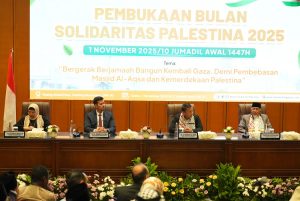


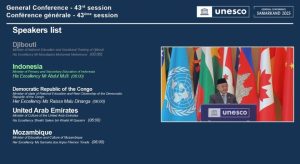
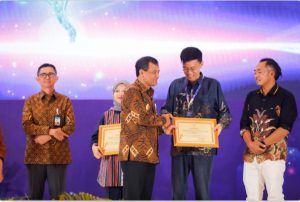




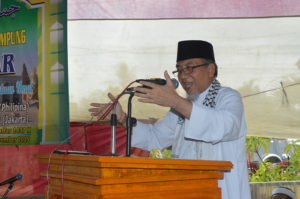

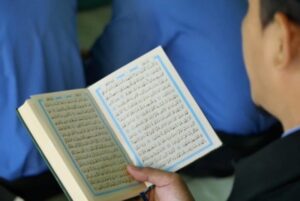





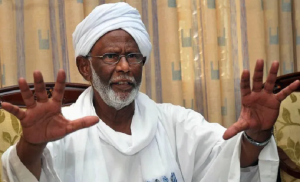
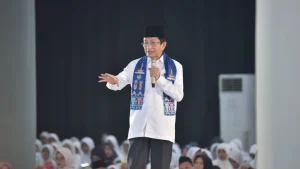





 Mina Indonesia
Mina Indonesia Mina Arabic
Mina Arabic